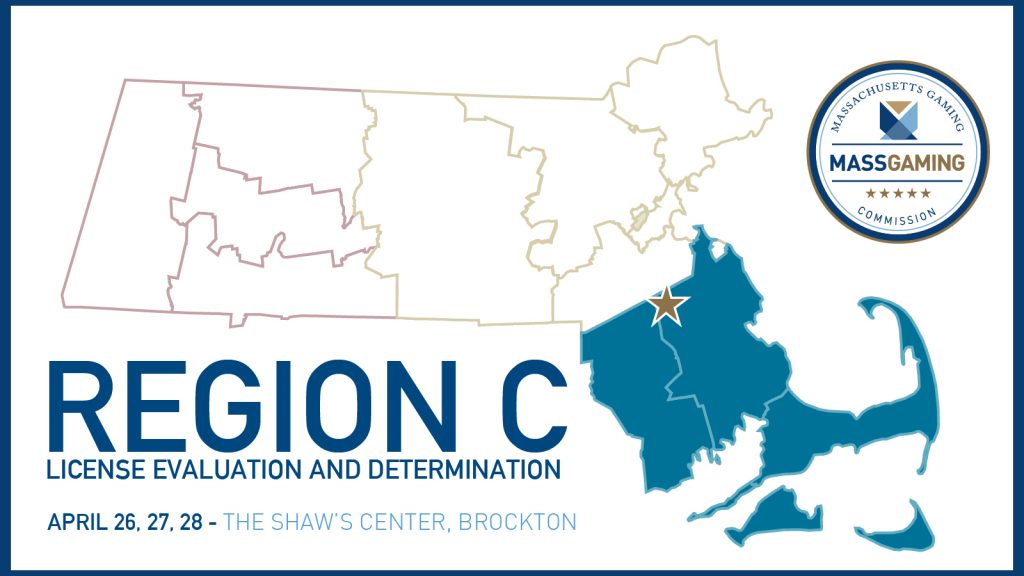UPDATES: Region C resort-casino application evaluation process
- April 26, 2016
- by MGC Communications
- 0 comments
Beginning on April 26, 2016 at the Shaw’s Center in Brockton, the members of the Massachusetts Gaming Commission presented their reviews of the category 1 RFA-2 applications submitted by Mass Gaming & Entertainment, LLC (MG&E) for a proposal in Brockton.
The information presented on this page will lead to public deliberations and ultimately result in the determination of the award of the Region C (Southeastern Massachusetts) resort-casino license.
Each of the five Commissioners has taken the lead on overseeing a group of advisers and industry experts to evaluate each gaming proposal based the Commission’s key evaluation categories including: Finance, Mitigation, Economic Development, Building & Site Design, and General / Overview.
These final steps of the ‘Evaluation Process’ are being conducted in an open, public manner consistent with the Commission’s mission statement of creating a fair, transparent, and participatory process for the arrival of expanded gaming.
Phase 2 Applications
Below please find the public portions of MG&E’s Phase 2 application.
Evaluation Presentations
Summaries of each Commissioners’ findings are posted below, accompanied by links to the full presentations.
Correspondence received by MGC is available on the official Meeting Archive.
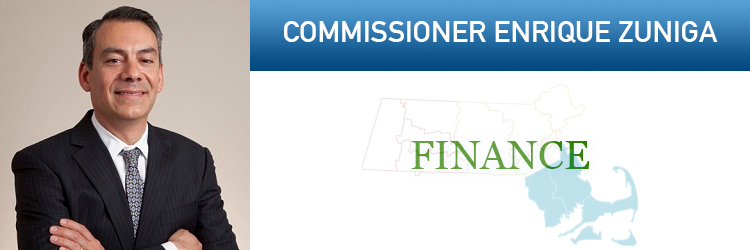
OVERALL RATING – SUFFICIENT / VERY GOOD
Brockton/MG&E has demonstrated that they have the financial capabilities and necessary capital required to develop and operate their proposed project. Brockton/MG&E’s view of the market opportunity demonstrates a solid understanding of existing awarded casino licenses in Massachusetts (specifically market differentiation from Everett/Wynn). The operations plan submitted aligns with this view of the market opportunity.
While Brockton/MG&E’s investment plan (e.g. spending of contingency amounts required to meet $500 million eligible capital threshold) acknowledges future potential Region C competition (i.e. Taunton casino), their market assessment does not fully appreciate the potential magnitude of this competition. Brockton/MG&E is relying upon their experience in other competitive markets to effectively compete for a share of the Massachusetts casino market with a Taunton casino. This experience however is not fully comparable to the Massachusetts market as they will not be the closest casino to the core population base in the Boston market (Everett/Wynn will be the closest casino).
Overall, Brockton/MG&E’s proposal is sufficient with very good elements, namely the financial strength (ability to obtain project capital) and the operations plan (alignment with the market opportunity).
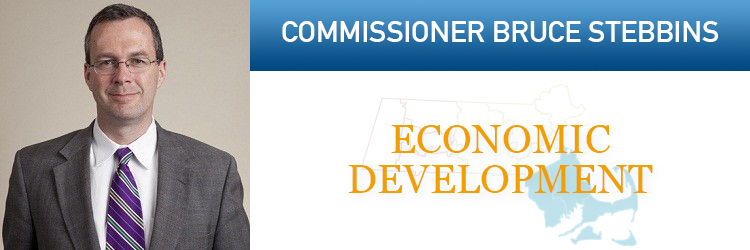
OVERALL RATING – SUFFICIENT
As an overall comment, Applicant provided reasonable detail on achievements at existing casinos in other jurisdictions—across all three economic development focus areas—but failed to sufficiently elaborate on specific plans, targets and intentions for the Brockton project.
Within the Job Creation area, Applicant quantified employment from both construction and ongoing operations. Applicant’s anticipated salaries and wages, on a $/FTE basis, are lower than Category 1 casinos approved in Regions A and B, depending on market conditions and availability of qualified workforce some challenges may occur in filling all positions at these pay scales. Projected benefits are consistent with projected compensation.
The discussion of job opportunities for the unemployed and underemployed lacked targets or clear delineation of plans and activities. Similarly the section on workforce training was inadequate, failing to identify host community colleges or other vehicles for delivery of training. However, the Applicant demonstrated success in both these areas at their Pittsburgh, Philadelphia and Des Plaines casinos.
Employee retention rates at existing casinos, and expected rates at the Brockton project, are reasonably low (i.e., high turnover) when compared to industry averages as well as rates proposed by other Category 1 applicants.
Applicant provided a description of the vendor outreach process for operational goods and services. Applicant also sufficiently addressed plans for promoting local and regional businesses although more could have been done to identify specific businesses and how these businesses might be better involved. No detail was provided on vendor outreach for construction.
With respect to vendor diversity targets, Applicant failed to identify targets for MBE/WBE/VBE participation and provided insufficient discussion on building awareness, strategies for involvement and development, joint ventures and mentorships, monitoring process, and project operations training with respect to MBE/WBE/VBE.
Applicant views the Brockton casino’s primary market as the greater Boston area as evidenced by the tourism-oriented marketing initiatives described in the Application. Aside from agreements with neighboring facilities (Campanelli Stadium, Shaw’s Center) few other formal arrangements have been put in place (for the most part, the Application even fails to identify regional tourism marketing entities or tourism operators) . These marketing initiatives reflect an entirely local/regional casino positioning.
Similarly with the job creation and small business sections, the Applicant’s description of achievements at other casinos is far more thorough than the plans for Brockton. The Applicant demonstrated a reasonable linkage to the regional economic plans (e.g. Brockton 2025) and commitment to non-competition with local entertainment venues.

OVERALL RATING – SUFFICIENT
MG&E has submitted an Application that is ‘sufficient’ in almost all respects. Taken as a whole, it is solidly sufficient. There is nothing especially exciting about the proposed casino/hotel, although the exterior design creatively seeks to evoke the look and feel of a New England manufacturing city like Brockton. There are no significant design deficiencies.
MG&E intends the casino to be a regional destination, offering first class gaming, hotel and dining options. In conjunction with the Shaw’s Center and Campanelli Stadium, the casino is intended to anchor an entertainment district. The masonry exterior recalls mill buildings and historic properties.
The Gaming Establishment consists of three main elements:
- Casino floor and associated food and beverage (F&B) venues
- Multi-purpose ballroom and associated conference/meeting rooms
- Hotel and spa.
These are well arranged to support the different uses, but the overall design is inward focused from the surrounding community. A potential opportunity is lost or delayed by not incorporating the adjacent historic Brockton Fairgrounds Exhibition Hall in the gaming establishment. The size of the proposed casino and hotel facility is approximately 466,000 square feet, at an estimated construction cost of approximately $295,000,000.This cost does not include furnishings, fixtures, gaming equipment or land costs. A cost comparison between MG&E Brockton and MGM Springfield casino, indicates that the quality of amenities will be similar.
The site plan provides adequate access/egress for patrons and employees arriving by car and adequate parking in a three level garage and at grade. Pedestrian circulation on the site will need to be further developed as the design progresses. MG&E will evaluate the viability of a shuttle bus between the MBTA downtown station and the casino and will work with the local transit agency to integrate the site into local bus routes.
The existing off-site transportation network was evaluated using accepted procedures, but will need to be expanded through the Massachusetts Environmental Policy Act (MEPA) process. The primary access is from Route 24 along Route 123 (Belmont Street) to West Street and Forest Avenue into the site. MassDOT has preexisting plans in place to reconstruct Belmont Street. MG&E will upgrade West Street and Forest Avenue. The roadway and signal improvements proposed by MG&E are estimated to cost 10.2 million dollars.
Where specific information on sustainability and security is lacking in the Application there is normally a performance standard that will need to be met as the initial design concepts are further developed. For example, information on specific sustainability measures is limited, but MG&E has committed to certify the casino as LEED Gold. Further, in terms of security, MG&E has provided protocols used at their other casinos (surveillance, communication and security plans) that will be used in Brockton, tailored to MGC regulations.
MG&E provided adequate information on water, wastewater and stormwater infrastructure. The City can provide water and MG&E is proposing approximately 1 million dollars of off-site sewer improvements to connect to the City’s system. The stormwater management system will retain runoff to provide 50% of irrigation needs and meet DEP stormwater standards.
Permitting for the project is straight forward, primarily because the 46-acre site was previously developed as the Brockton Racetrack and Fairgrounds. It is relatively open with few structures of any size. The MEPA process needs to be completed, followed by a MassDOT permit for off-site roadway construction and local permits from the Brockton Planning Board and DPW. There are no tidelands, wetlands or other sensitive environmental features that require extensive permitting.
In terms of schedule, the critical path runs through completion of the MEPA process, the MassDOT permit and the time needed to complete off-site roadway construction. The current schedule calls for an opening in June 2019, with the possibility of an earlier opening at the end of 2018, if the permitting process can be accelerated.
The most positive aspects of the Application are listed below:
- MG&E’s parent company, Rush Street, has a track record in the type of casino proposed in Brockton and appears to understand the market.
- The development team that has been assembled has experience designing casinos and has strong local technical support.
- Based on construction costs per square foot, the MG&E Brockton casino is similar to the MGM Springfield casino.
- MG&E has committed to a certified LEED Gold facility, which requires a significant commissioning effort. Further, Rush Street has built a LEED Gold casino in Pennsylvania.
- Despite a close vote in Brockton approving the casino, the City administration—significantly including the Superintendent of Schools— is unqualifiedly supportive.
- The City Administration has created a zoning overlay district that allows the casino to be constructed ‘by right’.
As the design and permitting processes proceed, the following issues should be further developed.
- The proposed building and site plans are inward focused and, as presently configured, do not create positive interaction with surrounding commercial uses. A $100,000 commitment has been made to prepare an Entertainment District study. This study should be accelerated, with input from MG&E, to build excitement and a vision for future development.
- Additional transportation improvements/commitments should be considered through the MEPA process for Belmont Street/Kenelworth Avenue and Route 27/West Street.
- Additional mitigation should be considered through the MEPA process to improve water conservation and to protect the City’s Silver Lake reservoir system.
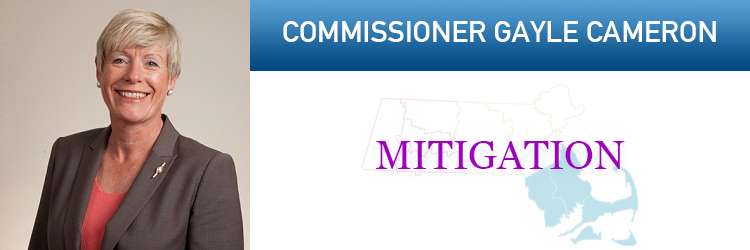
OVERALL RATING – SUFFICIENT
The Applicant has executed a Host Community Agreement and associated mitigation documents with the City of Brockton. A certified election in Brockton was held in May 2015 that approved the casino project, albeit by a small majority; 50.5% in favor and 49.5% opposed. The Applicant will provide the City 18.5 million dollars before the casino opens for infrastructure improvements and other city costs. After opening, annual payments will be at least 10.3 million dollars, or more depending on the gaming revenues. This will be reduced to a minimum of 7 million dollars if a tribal casino is built in the region.
The Applicant has executed Surrounding Community Agreements with all nine designated communities (Abington, Avon, Easton, East Bridgewater, Holbrook, Pembroke, Stoughton, West Bridgewater and Whitman). There is an executed Impacted Live Entertainment Agreements (ILEA) with Brockton 21st Century, which owns Campanelli Stadium and Shaw’s Center.
The site plan provides for adequate access and egress to the casino and hotel for cars, buses and taxis.
There is also an appropriate distinction between patron and employee access/egress.
The adequacy of the existing transportation network was evaluated using acceptable procedures including baseline and projected traffic volumes, trip generation rates and modeling. For the area intersections studied to date, a reasonable package of mitigation measures has been proposed. This primarily includes roadway and traffic signal improvements to Forest Avenue and West Street for an estimated total cost of $10.2M. In addition, MassDOT is planning on upgrading Route 123 (Belmont Street) from Route 24 to West Street, the main access to the casino. The first two Phases of the DOT work on Belmont Street should be completed before the casino opens.
The following further traffic mitigation should be evaluated as part of the ongoing MEPA process:
- Safety mitigation at the Route 27/West Street intersection.
- Mitigation for the Belmont Street/Kenelworth Avenue intersection.
- Reevaluate the proposed realignment of West Street in front of the casino with respect to the Belmont Street intersection.
In terms of transit, the Applicant is considering shuttle bus service, including connections to the Brockton Area Transit Authority (BAT) downtown station and integrating a casino bus stop with existing bus routes. These discussions with the BAT should continue, with minimum mitigation including a local bus stop at the casino and an evaluation of the viability of a shuttle service from the Brockton MBTA Station to the casino.
The payments by the Applicant to the City itemized in the Host Community Agreement and the Mitigation Agreement is sufficient to mitigate potential impacts to housing, schools and public safety (police and fire).
The applicant’s response to the Mitigation questions concerning responsible gambling practices and policies generally expressed a willingness to conform to the tactics described in the MGC Responsible Gaming Framework (RGF).
The Applicant understands the need to reach an agreement with the State Lottery and has identified strategies from other states to incorporate into such an agreement.
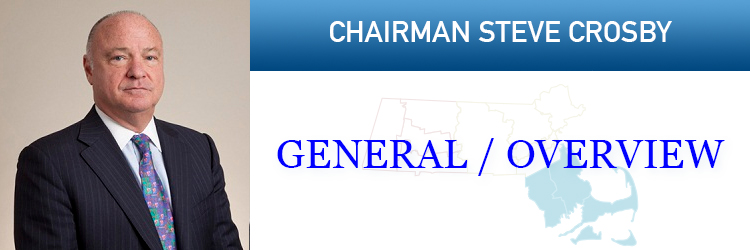
OVERALL RATING – INSUFFICIENT
The answers to Questions 1-4 seem to have been delivered with a very casual attitude toward our detailed evaluation criteria and with little if any attention paid to the applications of those criteria in other Regions. Two principal concerns, in conclusion:
- Although there is ample suggestion at other Rush locations that the operator knows how to pay attention to these criteria, there is no evidence of that commitment in this proposal, in terms of specific plans, programs, partners or other real commitments.
- The expanded gaming legislation made a high priority that our facilities should be “destination resort casinos” with a deep commitment to associated economic development. This proposal presents a plan for a nice local convenience casino – and it is not at all clear that such a casino is compatible with our Legislative mandate, or with our well-established Category 1 criteria to date.
